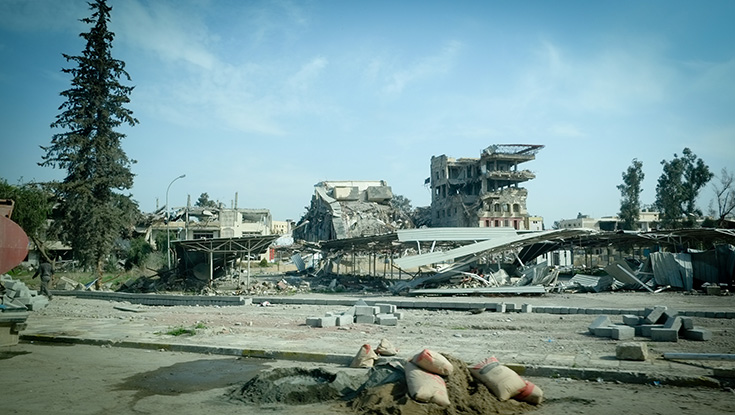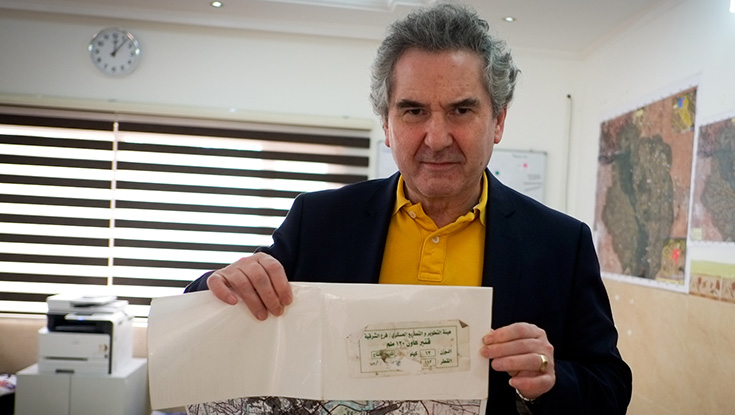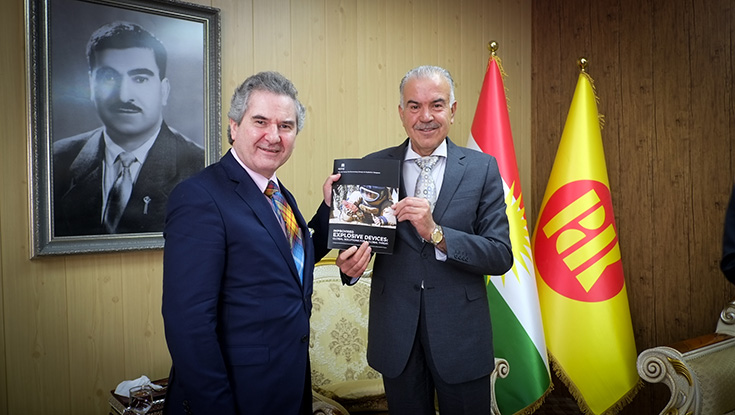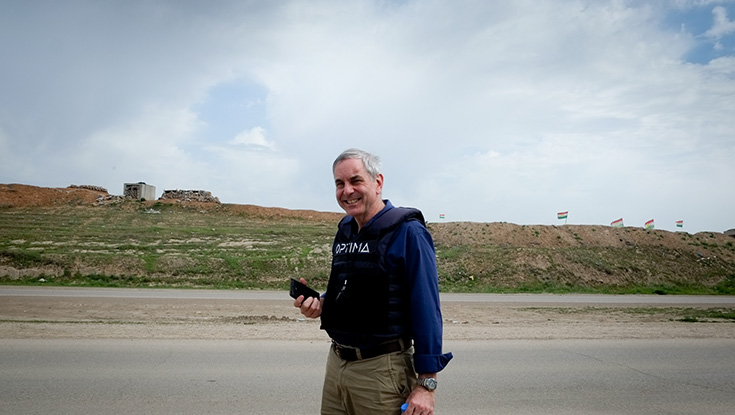A look at mine clearance in Iraq
Nigel Ellway, Head of Secretariat for the All Party Parliamentary Group on Explosive Weapons, provides CRJ with some observations from a recent visit around Mosul, Northern Iraq

Mosul lies in ruins (photo: David Pratt)
Sitting in the back of a car watching a man selling oranges from a barrow on the side of the road. I wondered, not for the first time, how I came to be there.
In the car with me was the Glaswegian veteran war correspondent David Pratt, our close protection officer Ollie, and Shahim our Iraqi driver. The car we were in was a non-descript Land Cruiser armoured by Streit Group and in the vehicle behind us was Member of Parliament (MP) Roger Mullin, vice chair of the All Party Parliamentary Group (APPG) on Explosive Weapons and Charlie Martell, Optima Group’s country manager for Iraq.
The town was Mosul, and despite the raging war going on in the West of the city people were already attempting to return to some form of normality in the Eastern sector.
Nearly every day for the past few weeks the fighting between the Peshmerga and Iraqi army forces and the so-called Islamic State (IS) has been on the front pages and broadcast news around the world, but the story of the daily activity of people like Charlie and his team goes untold.
Optima's team of specialists are regularly called upon to clear Mosul's schools, hospitals and other critically important sites – such as power stations and water treatment plants – of the explosive remnants of war and, more terrifyingly, improvised explosive devices (IEDs) often left as booby traps in buildings.
One of Optima’s team presented our group with a chilling introduction to IED detection and neutralisation – IS is now getting so good at making IEDs that they come with their own quality control labels attached, as shown by Roger Mullins, MP, in the picture below.

(photo: David Pratt)
We were with the Optima team because Roger Mullin had been invited as a Scottish National Party parliamentarian to lead a delegation holding talks with the various Kurdish political groups organised by the Westminster Foundation for Democracy. This trip was ahead of the Secretary of State for International Development’s announcement of major funding for mine-action and counter-IED work, and Foreign and Commonwealth Office (FCO) Minister Tobias Ellwood’s visit to Baghdad and Erbil.
Over the last year, the All Party Parliamentary Group (APPG) on Explosive Weapons has held an inquiry into the use of IEDs, which led to a report and recommendations to government. Visiting Mosul threw up even more questions – especially around the fate of the internally displaced people, who are too scared to return to their homes because of the likelihood of IED booby traps.
On our first morning in Erbil we had a compelling introduction to the initial treatment of IED victims – medical charity Emergency UK (CRJ 12:1) runs a trauma hospital in the centre of Erbil in which 78 per cent of the patients are blast victims. Giacomo Menaldo, Humanitarian Response Programme Manager showed us around.
In a ward full of children, Giacomo explained that because of local politics, a victim from Mosul would be taken in an Iraqi ambulance to a check point between Mosul and Erbil where, regardless of the weather, they would be transferred to a Kurdish ambulance to be brought the remainder of the way to the already stretched Emergency hospital.
Giacomo’s anger was evident as he described how many children were injured by explosive blasts – and how entire families were torn apart by the violence just 50 miles down the road. “IS are complex,” he fumed, “their weaponry is effective. They cause chaos. Civilians are used as a tool to slow down the military.” Emergency’s medical team works tirelessly to mend the broken bodies, but the longer term psychological affects are left to chance.

Member of Parliament Roger Mullin hands Hoshyar Siwaily Head of Foreign Relations Office ?Kurdistan Democratic Party a copy of the APPG report on IEDs (photo: David Pratt)
There was plenty of fuel in Giacomo’s narrative for the APPG’s second inquiry into the support for victims of IEDs, recently announced by the group’s new Chairman, Dr Matthew Offord MP (CRJ 12:2), and the questions raised in Iraq will be a major element of that inquiry.
The APPG on Explosive Weapons was first created as the APPG on Landmines back in 2011, with the name being changed to recognise the increasing use and hazards of IEDs. In addition to having a highly engaged membership of MPs and Peers, we are the only APPG that enjoys personal support from the responsible ministers and their departmental policy teams. What we have to say is listened to and appreciated.
In April last year at the United Nations 19th meeting of Mine Action Directors in Geneva, Roger Mullin, then Group Chairman, called for parliamentarians across the world to commit to work together against the scourge of illegally used explosive weapons.

The author, Nigel Ellway (photo: David Pratt)
Nigel Ellway is a former international journalist and Whitehall media advisor who created the APPG on Explosive Weapons in 2015 and now works with humanitarian de-mining and counter IED organisations to facilitate political awareness and understanding of the issues surrounding these disciplines. The author is enormously grateful to the Foreign and Commonwealth Office, and particularly the team in the Embassy in Baghdad and the Consular team in Erbil, for their extremely helpful and practical assistance; and to Optima Group for arranging an informative and highly sobering day in Mosul, with superb explanations and in-depth analysis of the issues. He would also like to thank Jamie Brotherston for setting up the project on behalf of WFD; to Roger Mullin MP for allowing him to hijack some of his visit; and to David Pratt for being an invaluable source of background detail and incorrigible Glaswegian wit.
A more detailed report on this visit to Iraq will be published in the next issue of the CRJ (12:3), due out in May.
Findings from the APPG’s inquiry into the use of IEDs can be downloaded here
Nigel Ellway, 27/04/2017